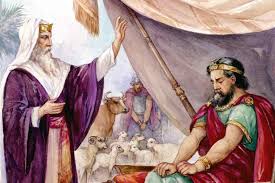Old Testament Lessons
For the last month, we have listened to a broad historical outline sketched out in the first book of Samuel. I and II Samuel are the first two books of a larger corpus of Old Testament histories covering the period that charts the rise and fall of monarchical tyranny in ancient Israel. More particularly, I & II Samuel, I & II Kings, cover the same period but from different editorial sources. The books of Samuel and the Kings are the product of the D or Deuteronomy source as are the books of Deuteronomy, Joshua, Judges, Ruth, and Jeremiah.
D source
The Deuteronomic narrative emphasizes the themes of obedience and disobedience to the covenant between Yahweh and Israel. Although drawing from older oral traditions brought south after the fall of the Northern kingdom in 721 BC, the books as written documents emerge between the 7th and 6th-centuries BC and are particularly associated with the discovery of the long-forgotten Book of the Law, uncovered in the wall of the temple during renovations, which launched the Josiah Reform in 622 BC.
The Deuteronomic history was further edited and re-cast by the scribes of the P or priestly source after 582 BC during the period of the Babylonian Exile in search of an answer to why God had abandoned Judah in 581.
Period of transition
I Samuel covers the period of political transition during which the Hebrew tribes emerge from a loose confederation ruled by charismatic judges, into the beginnings of a unified state that reaches its zenith under the kingship of David in the 10th-century BC.
With the advent of monarchy, the tension is set up between two competing theologies of government. Although Israel’s kings start out as agents of Yahweh, they are increasingly influenced by concepts of divine kingship that prevailed in the Middle East at that time. In resistance to this trend, the prophetic movement arose as a very necessary check on the notions of divine kingship, calling the nation back to its obedience to the Covenant with God.
Samuel
The person Samuel is the last of the great Judges in the line stretching back to Joshua son of Nun, the successor to Moses. Samuel now in his twilight years, is presented with the increasing demand of the people to give them a king so that they could be like the other nations. It’s clear that the loose tribal confederation is not efficient enough to marshal the necessary resources to resist the military incursions of the Canaanite kingdoms. Tired of being defeated in battle by their neighbors, the Israelites too, now want a king who would lead them to victory.
Samuel dislikes the people’s demand. He explains to the people that having a king will mean giving up their tribal independence and submitting to authoritarian, centralized rule, in which the king would have the first claim on their land, their labor, and their wealth. Samuel experiences the people’s demand as a personal rejection, about which he complains to God. God tells him not to get above himself, reminding Samuel that the people’s demand is not a rejection of Samuel, but a rejection of God. God effectively tells Samuel to give the people what they want in the spirit of the proviso – be careful what you ask for.
Saul
 Samuel’s choice was very predictable. Swayed by Saul’s appearances – tall, dark and handsome, Samuel anoints him king. Like many seemingly strong leaders, Saul’s narcissism is on the surface at least, attractive and impressive. He cuts a large swagger, is a big presence, and the people mistake this for real strength. Yet, like all narcissists, he’s a big man with a fragile ego. He is quick to take offense, has poor anger management control, and increasingly becomes more paranoid and vindictive. Despite initial successes, it works out badly for Israel under Saul, and it works out very badly for Saul himself.
Samuel’s choice was very predictable. Swayed by Saul’s appearances – tall, dark and handsome, Samuel anoints him king. Like many seemingly strong leaders, Saul’s narcissism is on the surface at least, attractive and impressive. He cuts a large swagger, is a big presence, and the people mistake this for real strength. Yet, like all narcissists, he’s a big man with a fragile ego. He is quick to take offense, has poor anger management control, and increasingly becomes more paranoid and vindictive. Despite initial successes, it works out badly for Israel under Saul, and it works out very badly for Saul himself.
Nepotism, ambition, and theology
There is an interesting subtheme in the book of Samuel. Four weeks ago, we listened to the call of the boy Samuel. In calling Samuel, God repudiates the priestly succession of Eli because Eli’s sons were corrupt grifters who exploited their position of power and privilege to the detriment of the people. We next jump ahead in the story to where after many years of wise leadership the people complain that they need a king because Samuel is now old, and they fear being left at the mercy of his own sons, who they complain do not walk in the ways of their father but have turned aside and taken bribes.
Rulers are one thing, but ruling families where the members exploit the privileges of power for their own interests, are quite another.
Samuel’s dislike of the demand for a king is both theological and personal. Samuel had already appointed his sons as Judges to succeed him. As God thwarted Eli’s dynasty, so God seems to now thwart Samuel’s dynastic pretensions. What goes around come around.
However, the more important point is Samuel’s theological objection to kingship. The focus of the Deuteronomic history is faithfulness to the covenant between God and Israel. Yahweh is Israel’s only king. If Israel has a king like the other nations, Samuel rightly foresees that the prevailing regional models of divine kingship will cause Israel to reject Yahweh as their only king.
Samuel’s fears are well-founded. For the rest of the Deuteronomic history is the sorry tale of how Israel’s kings, again and again, placed themselves above obedience to the Covenant Law under which they ruled as God’s agent, not as God’s replacement.
Last week, we listened in the Samuel narrative to the anointing of the shepherd boy David to be king in Saul’s place. This time, God is leaving nothing to Samuel’s weakness for narcissistically handsome, warrior-like men with good legs. To Samuel’s  surprise, God passes over all the virile sons of Jesse until it seems he has run out of options. But there is one son remaining and when he is summoned he appears to be a boy with ruddy cheeks and bright eyes.
surprise, God passes over all the virile sons of Jesse until it seems he has run out of options. But there is one son remaining and when he is summoned he appears to be a boy with ruddy cheeks and bright eyes.
Samuel pours the oil of anointing over David in secret. No one tells Saul he is no longer king. But as David notches up military victory one after another, in today’s installment it seems something is beginning to dawn on Saul. Despite David’s successes and his ability to charm the increasingly paranoid king, Saul suspects something is up:
So Saul eyed David from that day on. The next day an evil spirit from God rushed upon Saul, and he raved within his house, while David was playing the lyre, as he did day by day. Saul had his spear in his hand; and Saul threw the spear, for he thought, “I will pin David to the wall.” But David eluded him twice.
David
David goes on to become the exception to the rule concerning kingship in Israel. Though hardly a paragon according to contemporary evangelical ideals of virtue, he nevertheless ruled over a golden age never to be repeated. David ruled 7 years in Hebron before conquering Jerusalem and making it his capital from where he ruled a further 33 years.
By the standard of the times, his was a long reign during which Israel morphs into a unified and powerful kingdom, rivaling those of the states around it. But David’s monarchy is a blip in the long trajectory of good governance in Ancient Israel. Although David faced the pervasive tendencies to concentrate power absolutely, what saved him and the nation time and again was his love of God and his willingness to be faithful to the covenant ideal that Israel had only one king, and Yahweh was his name.
When the prophet Nathan accuses David of engineering the death of Uriah so he could take the man’s wife, David presented with his crime, repents. David’s greatness lay in his ability to recognize the limitations of his power when it came to obedience to Israel’s covenant with God. A man of his time, nevertheless David is rare among the Israelite kings in his desire to love and honor Yahweh.
When the king ruled as God’s agent and not in God’s place, the nation prospered because this covenant form of government offered a more effective set of checks and balances capable of successfully negotiating competing interests.
After David, monarchy brought disastrous consequences for Isreal, beginning with his son, Solomon, whose taxes and dalliances with foreign religions oppressed the people and set the scene for the division of the unified kingdom following his death.
The Deuteronomist’s repeated judgment on each reign was whether this king did or did not walk in the ways of David, whether this king was faithful or unfaithful to the covenant with Lord.
Lessons from history
The Covenant between Yahweh and Israel was intended to function as a constitution, setting out the system of checks and balances in the interests of good government. Like Samuel, the framers  of the American Constitution feared the people’s demand – give us a king, for there were many who at the time thought General Washington would make a fine king.
of the American Constitution feared the people’s demand – give us a king, for there were many who at the time thought General Washington would make a fine king.
And so the Framers wrote into the Constitution the complex system of checks and balances to ensure governance capable of negotiating different interests, which when taken together represented effective governance, serving the interests of the people while not pandering to the rabble cries of the crowd.
Their vision was not of popularism – governance at the mercy of the crowd, but republicanism – government reliant upon a system of checks and balances in which power and the limits to the exercise of power are clearly set out.
I guess we are all wondering what the future holds, but one thing is clear, we are now in the midst of a constitutional crisis. What the Founding Fathers most feared, is the very thing that results when Congress, craven before the demands of the rabble, abdicates power to an increasingly authoritarian Executive.
What alarms me is the historical amnesia. Let the Deuteronomic history of the Biblical record of Israel’s struggles with itself and its God be a lesson for us.
As the prophets in Ancient Israel knew only too well, tyranny is but one short collective memory loss away.

Leave a comment